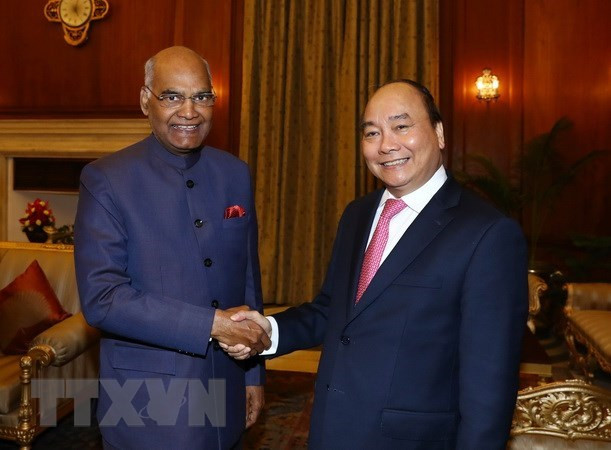 Prime Minister Nguyen Xuan Phuc met Indian President Ram Nath Kovind in New Delhi on January 24, as part of his visit to attend the ASEAN – India Summit in India (Photo: VNA)
Prime Minister Nguyen Xuan Phuc met Indian President Ram Nath Kovind in New Delhi on January 24, as part of his visit to attend the ASEAN – India Summit in India (Photo: VNA)New Delhi (VNA) - Intensityand momentum of Vietnam-India bilateral engagement have created win-winsituation for both countries, according to Dr. Faisal Ahmed, AssociateProfessor and Chairman of International Business Area at FORE School ofManagement, New Delhi.
In a recent interview granted tothe Vietnam News Agency, the scholar noted that looking closely at theintensity of India-Vietnam engagements in the near past, it can be said that ittruly exemplifies a pro-active approach in managing bilateral relations.
He said after the two countriesagreed to upgrade their level of engagement from strategic partners to a“comprehensive strategic partnership” in 2016, India’s exports to Vietnam in2016-17 increased by 28.87 percent over the previous year. And interestingly,Vietnam’s exports to India also increased by 29.69 percent, while the bilateraltrade stood at 10.11 billion USD, which was again a 29.14 percent increase fromthe previous year, Dr. Faisal Ahmed said, stressing that all those statisticsclearly revealed that intensity and momentum of the bilateral engagement hadcreated win-win situation for both countries.
Recalling that last year,President Pranab Mukherjee called upon the two countries to work toward a 15billion USD target for bilateral trade by 2020, Dr. Faisal Ahmed believed thetarget was quite achievable given the intensity and level of cooperation. Accordingto him, with the momentum set forth by Prime Minister Narendra Modi, the twocountries could even expect to achieve a higher target for trade and anincrease in bilateral investments.
Faisal Ahmed really appreciatedthe way the bilateral institutional frameworks had helped in enhancing economiccooperation. He said the role of industry chambers, the role of regionalcongregations like Mekong-Ganga Cooperation (MGC) and also the role ofIndia-ASEAN FTAs in goods as well as in services have immensely contributed tothe development of bilateral cooperation. Policy frameworks like the “Look EastPolicy” and now its successor “Act East Policy” too were being leveraged wellby the government to boost India-Vietnam bilateral ties, he said.
Mentioning the potentialitiesthe two countries have not yet tapped, Dr. Faisal Ahmed suggested that Vietnamand India need to focus on three crucial aspects, the first of which is GlobalValue Chain (GVC). According to him, the participation of both India andVietnam has relatively been less than their true potential. He thought the twocountries could collaborate with each other in developing GVC especially insectors such as apparel, footwear, electronic goods, and even petrochemicals.
The second important aspect isthe development of SMEs, the scholar said, calling on the two countries to developformal institutional frameworks that could guide SME’s role and participationin the GVCs. The focus could be on creating SME clusters linked to leadingfirms. This would help in creating avenues to address SME-related challengeslike adapting to global demand, availability of finance, managing supply-sideconstraints, innovation, access to technology, reducing carbon emission, amongothers.
And thirdly it is the ServicesSector. Faisal Ahmed noted that India’s global exports of services were 161.8billion USD while Vietnam’s global services exports stood at 12.38 billion USD in2016. Vietnam’s economic activities were quite consistent in terms of theparticipation in GDP. Agriculture sector made a 15.9 percent contribution toVietnam’s GDP, while industry contributes 32.7 percent and service sector 41.3percent. He believed that with such a structure, Vietnam has huge potential todevelop its services sector, especially information and communicationtechnology, financial services, tourism, logistics, and even higher educationin collaboration with India.
Accordingly, Dr. Faisal Ahmed specificallynames three mechanisms that could potentially increase economic cooperationbetween the two countries, which are B2B meetings and further liberalization ofMode-4 to enhance participation in global value chains; public diplomacy as aninstrument for “social connect” to encourage people-to-people interactions; andmaintaining a continuity in strategic and defence cooperation to keepleveraging mutual benefits.
Dr. Faisal Ahmed held theposition of consultant to the United Nations Economic and Social Commission forWestern Asia (UNESCWA) and other organisations, and has led project supportedby the Ministry of Commerce & Industry of India. His articles have appearedin leading newspapers like The Financial Express, The Hindu BusinessLine, and The Economic Times. The scholar has also been on expert panel innational and international media on trade and geopolitical issues.-VNA






























